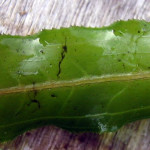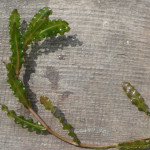Gallery:
- Potamogeton crispus turian, this species’ main reproductive method
- Potamogeton crispus leaf
- Potamogeton crispus stem and leaves
- Potemogeton crispus plants
Common names:
Curly-leaf pondweed, curly pondweed
Scientific Name:
Potamogeton crispus
Description:
Curly-leaf pondweed grows entirely underwater except for the flower stalk which rises above the water. It has distinctly wavy-edged, crispy olive-green to reddish-brown leaves. It usually grows early in spring and dies back in summer. Flowers are tiny with 4 petal-like lobes and in spikes around 1 inch long from stalks that are up to 2.8 inches long. Leaves alternate, all submersed without leaf stalks. Leaves oblong, stiff, (1.6 to 3.9 inches long by 0.2 to 1 inch wide) with distinctly wavy edges with fine teeth and 3 main veins. It produces seeds, rhizomes and turions, but the importance of seed in the spread of populations is unknown and is assumed to be less important than turions. Typically it reaches peak biomass in the late spring/early summer months and forms turions.
Life cycle:
Height of mature plants
N/A
Flower color:
Bloom time:
April through May
Look-a-likes:
None
Habitat:
It grows in shallow to deep, still or flowing water and is tolerant of disturbance.
Impacts:
It is an invasive plant that forms surface mats, interfering with aquatic recreation. Dense colonies can restrict access to docks and sport fishing. Curly-leaf pondweed has been noted as one of the most severe nuisance aquatic plants in the Midwest.
Noxious Weed Listing:
- WeedWise: Maintenance
- State of Oregon: Not listed
- State of Washington: Class C
- Four County CWMA: Class C
- Columbia Gorge CWMA: Class C
Origin:
Asia, Europe, Australia and Northern Africa
Links:
Washington Noxious Weed Profile
Invasive.org profile
CABI Invasive Species Compendium
National Invasive Species Information Center
Global Invasive Species Database




